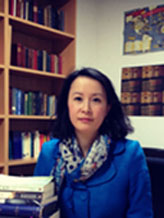
Professor Nancy Jiwon Cho of the Department of English Language and Literature is a Korean-British professor teaching the Special Topics in English and American Literature course on British women's poetry this semester. She is very popular among the students studying English literature for her deep insights and unique teaching style encouraging students' participation.
- Please introduce yourself:
I'm a British-Korean scholar of English literature. I was born in London but lived in Seoul as an infant and attended my first year of elementary school here. My family moved back to England when I was seven, and I grew up there. I undertook my BA and MA at the University of London, but I moved to the University of Durham in the North of England for my PhD to work with the world expert in my field (the English hymn), J. R. Watson. After obtaining my doctoral degree, I worked as a postdoctoral research fellow at Nottingham Trent University until September 2010 when I came to teach at SNU.
- When and why did you first decide to major in literature?
Up to the age of sixteen, history had always been my favourite subject. However, just before applying to university, I discovered that I preferred studying English literature because there is so much room for creative personal interpretation depending on the methodological approach or theoretical stance you take and what knowledge you bring, and I really enjoyed this aspect of literary study.
- What made you decide to teach at a Korean university?
Being ethnically Korean, when I was offered the opportunity to come to work in Seoul, I thought it would be a very exciting opportunity because, although I had visited Korea on holidays growing up, I wanted to experience life in Korea as an adult. Also, as I was very much aware of the prestigious reputation of SNU, I wanted the chance to teach the top students of the country, and to share with them the issues and ideas that I find fascinating. In addition, I knew that many professors in Korea have studied in the US, so I was keen to introduce students to British approaches to English literary studies.
- What is your specific field of expertise and current research interest?
My area of specialisation is women's writing and religion from the mid-eighteenth century to the present. My Ph.D. thesis was on the rise of British women's hymn writing from the middle of the eighteenth century to the time of the Second World War. There were hundreds of women hymn-writers during the long nineteenth century but very little work had been done on the subject previously.
My current research interest is very interdisciplinary covering writing, gender, religion and history. I'm interested in numerous issues including: women's life writing, hospitality, Englishness, and affective theory. I'm currently working on a number of essays; for instance, an article on the use of hymnic language in contemporary English indie folk music which seeks to explore the relationship between the hymn and Englishness in today's post-secular British society.
- Please introduce the Women's Poetry course you are teaching this semester.
For my special topic course in the English department, I'm focusing on British women's poetry of the eighteenth and nineteenth centuries. It's a research-led course for students wishing to extend their knowledge of English poetry, and learn about women's contributions to the development of English verse. The issues that we're exploring include: how women writers entered into public print culture in times when society prescribed that they should be modest and domestic; the modes and subjects women privileged in their verse, such as sensibility and sympathy; and women’s innovations to verse forms, such as Charlotte Smith's revival of the sonnet in the 1780s, which influenced Wordsworth and Coleridge hugely.
- Who is your favourite writer?
As a scholar of literature, I admire many writers for different reasons. However, a new favourite writer for me is the American novelist Marilynne Robinson. I discovered her novels last year and found Gilead in particular profoundly moving. It initially interested me as a version of the story of the Prodigal Son, but it was the narrative tone that I found most absorbing. I found Robinson’s slow and thoughtful measured pace, and insights into human experience nothing short of astonishing.
- Do you have your favourite quotation to share?
I will share a quotation from Henry Nouwen, a pastoral theologian whose writings helped me tremendously during my doctoral studies. He wrote: ‘The first task of educational institutions should be to protect the privilege of being school, escola, that means, free time for those who want to understand themselves and their world a little better.' It is still very important for me to remember this, and I encourage students to savour their years at university as a rare time in busy modern life to get to know the worlds outside and inside better.
Written By YANG Soyun, SNU English Editor, reminisceme@naver.com
Proofread by Brett Johnson, SNU English Editor, morningcalm2@gmail.com

